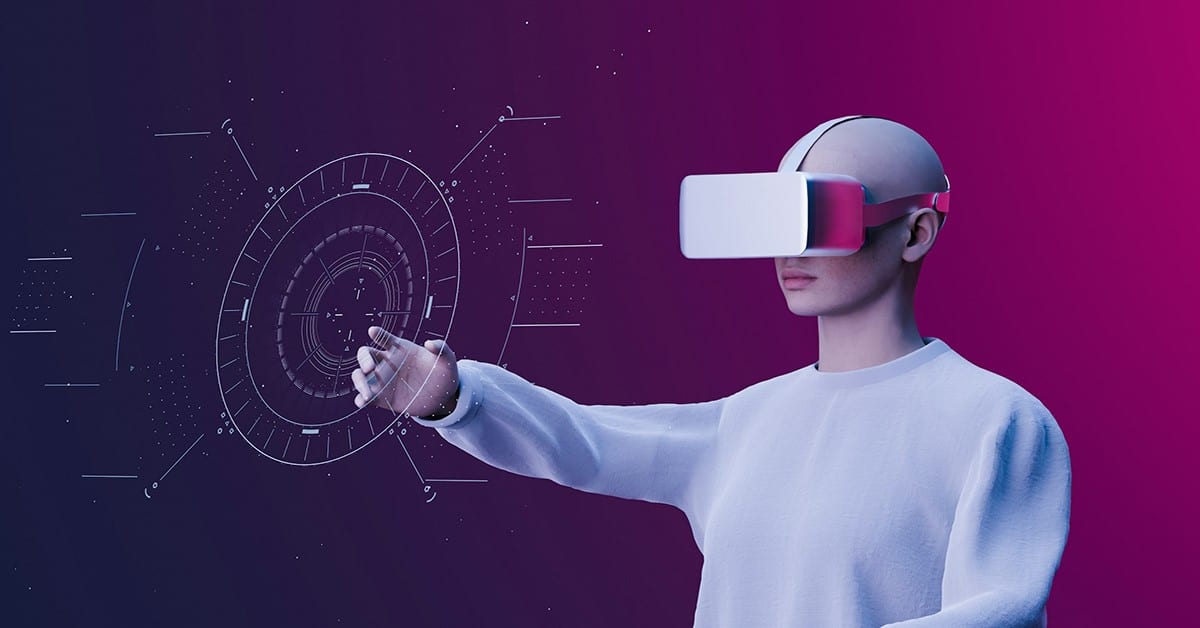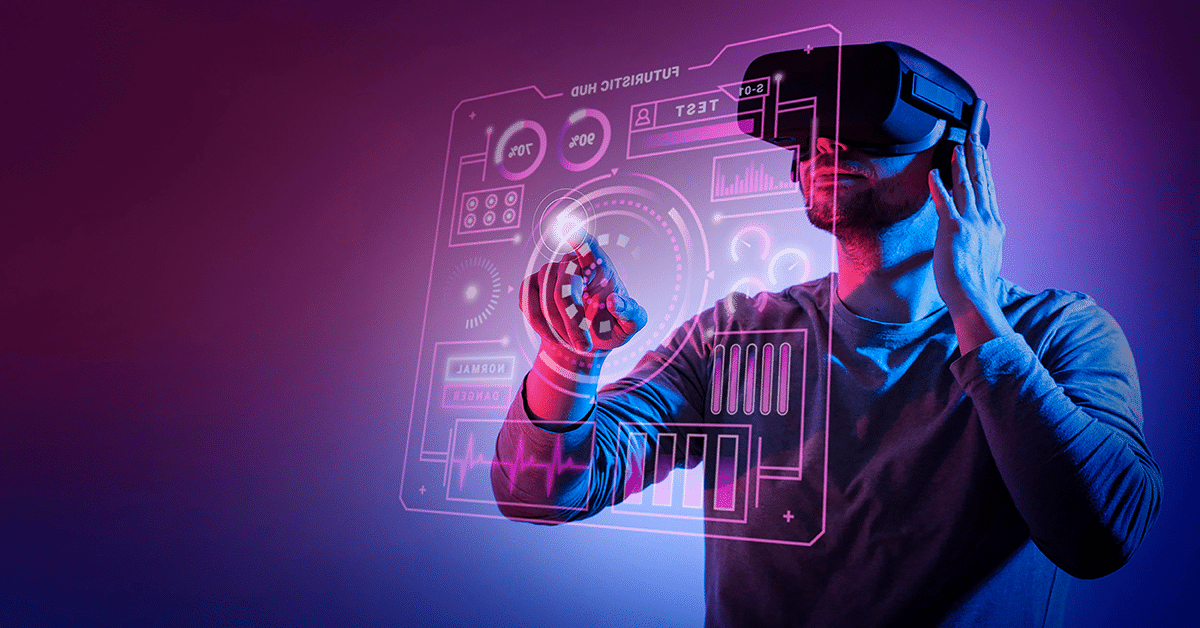AI marketing is one of the most exciting concepts of the modern era. It can combine the best elements of human and artificial intelligence into a powerful new whole. This might sound like science fiction, but companies already use these platforms. And you’re about to discover precisely how AI is leveraged for advanced marketing.
Quick Menu:
- AI Marketing as One Component of a Larger Metaverse
- What Is Artificial Intelligence (AI)?
- What Is AI Marketing?
- Benefits of AI Marketing
- Types of AI Marketing
- Understanding AI Marketing Tools
- Some Great AI Tools for AI Marketing
- AI Marketing Concerns
- AI Marketing as a Component of Metaverse Advertising
AI Marketing as One Component of a Larger Metaverse
AI marketing might seem like it appeared out of nowhere. But it can be seen as one element of the larger metaverse. The metaverse itself is a realm best described as a convergence between the physical and online worlds. It’s a shared world where you can hang out with friends and where your actions make a lasting difference.
Metaverse companies have created several different metaverse devices that can link the online and physical worlds together. This includes headsets that can fully immerse you in virtual reality. But you can even use augmented reality to add digital elements to the physical world with smartphone apps. And newer technologies like mixed reality can even mix different types of extended reality together. Platforms as diverse as desktops and game consoles all have some form of metaverse access available to them.
And the metaverse’s continual development means nobody knows exactly how it’ll turn out. There are multiple visions for the metaverse’s future. But you can now experience real-life implementations of the metaverse and related technologies like AI. You can learn more about this exciting new platform in the article “Metaverse Guide; Understanding The Basics Will Open Up a New World”.
What Is Artificial Intelligence (AI)?
Understanding AI marketing also requires a deeper dive into the subject of artificial intelligence (AI) itself. Artificial intelligence refers to any computer-based simulation of human intelligence. This is typically categorized into specialties like expert systems, speech recognition, natural language processing, or machine vision. These advanced functions typically require hardware and software specially designed for the task. AI is generally written in Python, R, C++, Java, and Julia though it’s not specifically tied to any programming languages. Additionally, most AI systems work by taking in huge amounts of categorized data, recognizing patterns, and then making predictions based on that pattern analysis.
What Is AI Marketing?
Marketing, like artificial intelligence, focuses on pattern matching. It involves matching a customer’s needs to a company’s various goods and services. AI marketing involves the use of any form of artificial intelligence within this process. This can be implemented in a number of ways. AI content generation is a common technique, as is AI automation in general. It’s best seen as a new tool within the industry. AI can be leveraged to increase the efficiency of teams and even automate blogging or email. These AI writing tools tend to be generative AI and create text or images based on prompts.
Benefits of AI Marketing
There’s a lot of data for marketers to keep track of between email, social media, and sales numbers. And this is part of why AI marketing has been so revolutionary. The AI can track all the raw number crunching while the humans leverage their natural creativity. This leads to a new and more effective type of strategic planning. The fact that AI can work with so much data also means that it can easily personalize features around every customer.
This allows companies to target specific interests and increase engagement and conversion rates. AI can also work through data to find the highest-value prospects and put extra priority on them. All of these elements and more lead to increased personalization. Companies can use artificial intelligence to create real connections with potential customers, which will, in turn, translate to increased customer loyalty and conversion.
Types of AI Marketing
Artificial intelligence is a broad subject. In fact, you can essentially apply artificial intelligence to most areas that involve human intelligence. But as with any tool, it’s proven especially useful in specific contexts. There’s a multitude of powerful artificial marketing technologies out there. But the following types of AI marketing have proven to be especially useful within the industry.
Ad Placements
Humans can only think of so many things at the same time. But an AI can effortlessly work through millions or billions of data points simultaneously. This enables AI marketing systems to predict what potential customers might be interested in expertly. And it translates into more effective targeted advertising with impressively high engagement and conversion rates. Additional marketing data can also come from analyzing elements like search behavior. AI can both use and generate additional data related to keywords, efficiency/ROI, ad performance, and targeting parameters. An AI’s ability to tailor presentations to individuals creates truly impressive results.

Image attribution: Lead Agency
Copywriting
Pattern analysis isn’t just about numbers. AI can also automate areas of copywriting by using natural language processing. AI marketing can leverage this technology to create social media, blog posts, and email that sounds as if it was written by a human. Keep in mind that this won’t create a marketing strategy from scratch. But it can implement some elements of one. This includes generating summaries for publication on the web, creating internal documentation, brainstorming, and even customer surveys through chatbot data. AI marketing is impressive because of what it can do and how fast it can do it.
Data Analysis
One of the biggest problems for marketers is the sheer amount of data they need to work with. Even the most talented people will struggle with millions of data points. But artificial intelligence is more than capable of juggling billions of data sets while also noting all the patterns and probabilities that link them together. Because AI marketing systems can judge so many data points, they can see both problems and potential far sooner than any human would. It can let companies take advantage of new opportunities and avoid potential pitfalls before they’d normally be apparent.
Automation
Automation is essentially the next step after data analysis. AI marketing systems don’t simply find patterns. The systems can also execute set rules that specify what the AI should do with that new data. For example, an AI system might be set up to automatically analyze a customer’s shopping preferences and recommend products they might enjoy. This can go far further than just noting simple preferences. An AI’s ability to work with large data sets means it can analyze many factors to personalize its approach. It’s a more efficient, personalized, and effective approach.
Chatbots
A chatbot is an AI marketing tool capable of simulating human conversation in real-time. Chatbots can be used in many different areas of customer support. But they’re most often used to summarize information for people. So instead of searching through a company FAQ, a customer could simply ask the chatbot a question. And a chatbot can even be embedded within web pages or apps so that it’s always there if a customer needs it. AI chatbots can provide affordable customer service that’s available 24/7. It’s a proven way of improving overall customer satisfaction.
Understanding AI Marketing Tools
All of these techniques have something in common. The examples leverage AI marketing techniques to collect and analyze data. This data can then be leveraged to automate elements of decision-making and even anticipate a customer’s next move. What makes these technologies valuable to everything from industry leaders to metaverse startups is their mix of intelligence with the amazing speed and tirelessness of computers. The AI’s capacity for pattern matching at such lightning speeds means that it can notice patterns within market trends. This lets it essentially predict the market’s upcoming changes. It’s a truly revolutionary tool for the business world.
Some Great AI Tools for AI Marketing
New AI contenders are appearing on the scene at a rapid pace. But as with any other technology, there are a number of AI options that are considered the best of the best. The following AI marketing technologies and tools are powering some of the world’s most innovative business strategies.
ChatGPT
ChatGPT is similar to other AI marketing technologies in that it can act as a chatbot. But it typically brings a much higher level of creativity and a wider scope of knowledge. In fact, conversations with ChatGPT can almost seem as if you were talking to another human. This makes it a perfect match for marketing endeavors that would benefit from an assistant. ChatGPT is a useful addition to endeavors with heavy use of languages, such as writing emails and task automation. It’s even capable of advanced techniques like enhancing the functionality of search engines or writing simple programming code.
Video: Introducing GPT-4
Brandwatch Consumer Intelligence
Brandwatch has over a decade of industry experience. And it’s leveraged that knowledge into two major categories of business solutions. These are consumer intelligence and social media management. The company’s consumer intelligence platform is also a fully integrated AI marketing tool. The platform analyzes data in order to understand better consumers, various brands, and the larger market as a whole. The system can then offer actionable analysis in easy-to-read formats to help users understand industry trends and customer perception. This ensures that you’ll be able to stay agile within the marketplace even during periods of rapid technological and social evolution.
Video: Brandwatch Consumer Research
Jasper AI
Jasper AI, formally known as Conversion.ai, is an advanced AI marketing platform with impressive functionality. It uses OpenAI’s GPT-3 model to generate fluid and natural text. Jasper AI’s built-in templates can even add powerful rules to the text generation process. This lets you implement goals such as PAS, AIDA, Before-After-Bridge Framework, and Feature to Benefit. It even handles e-commerce functionality like product descriptions or bullet points for popular stores like Amazon. And most of the platform’s functionality is accessible with only a minimal configuration level. Just provide your brand and products and let it go from there.
Video: Meet Jasper, your AI assistant
Seventh Sense
Seventh Sense is a powerful AI marketing tool focusing on email marketing through Hubspot and Marketo. Think about what you could do if you could personalize your professional email to suit any given individual. That’s exactly what Seventh Sense provides. It maximizes email engagement by ensuring that recipients receive emails at the perfect time. This doesn’t just ensure customers get the most out of the email. Tailored email enhances deliverability, which will, in turn, improve the sender’s score. This is a vital metric for any company with email batches that can number in the thousands.
Video: Email Deliverability Optimization
AI Marketing Concerns
For all the potential seen in AI marketing, there are also some equally significant concerns. One of the biggest issues comes down to technical sophistication. AI is a complex subject requiring skill and experience in the field to meld with existing workflows. AI needs to be expertly integrated in a way that augments the creative work of human beings. It’s easy to make a mistake at that stage and create problems rather than solve them.
For example, a rule-based chatbot can be tremendously helpful to customers. But chatbots trying to work beyond their capabilities can be more of an annoyance to customers. In those cases, it’d be better to use them as an assistant to human agents. And even powerful AI can cause other issues, such as raising customer privacy concerns. In the end, proper use of AI means keeping the customer’s needs as a top priority.
AI Marketing as a Component of Metaverse Advertising
AI marketing is one of the most important new forms of advertising. But metaverse brands have created a wide range of new tools and platforms. These concepts can help raise brand awareness or even engage potential customers with metaverse games. Coca-Cola has created NFT, Wendy’s can be found in Fortnite, and Gucci has a long and successful history with Roblox. Branding can also introduce exciting new metaverse events that combine a fun activity with product awareness. You can learn more about new marketing technologies in the article “Metaverse Advertising; Types of Metaverse Marketing & Examples”.
AI marketing is changing the world. Whether that’s intimidating or exciting is up to you. But remember, even learning about these concepts has already prepared you to benefit from them. It’s just a matter of keeping up with new developments.
Did You Like This Article About AI Marketing?
You might also be interested in the following articles:
- AR Marketing; Top Examples of Augmented Reality Marketing
- Metaverse Coins; What Is a Metaverse Coin & Where to Find Them?
- Metaverse ETF; Top 9 Metaverse ETFs to Consider Investing in









Very interesting article; the truth is that artificial intelligence is instrumental in marketing. It can also be beneficial to ask questions and find information, get insights for content marketing, etc.